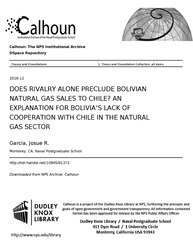File:DOES RIVALRY ALONE PRECLUDE BOLIVIAN NATURAL GAS SALES TO CHILE? AN EXPLANATION FOR BOLIVIA’S LACK OF COOPERATION WITH CHILE IN THE NATURAL GAS SECTOR (IA doesrivalryalone1094561372).pdf

Original file (1,275 × 1,650 pixels, file size: 2.16 MB, MIME type: application/pdf, 146 pages)
Captions
Captions
Summary[edit]
| DOES RIVALRY ALONE PRECLUDE BOLIVIAN NATURAL GAS SALES TO CHILE? AN EXPLANATION FOR BOLIVIA’S LACK OF COOPERATION WITH CHILE IN THE NATURAL GAS SECTOR
( |
||
|---|---|---|
| Author |
Garcia, Josue R. |
|
| Title |
DOES RIVALRY ALONE PRECLUDE BOLIVIAN NATURAL GAS SALES TO CHILE? AN EXPLANATION FOR BOLIVIA’S LACK OF COOPERATION WITH CHILE IN THE NATURAL GAS SECTOR |
|
| Publisher |
Monterey, CA; Naval Postgraduate School |
|
| Description |
This thesis explores the motivations behind Bolivia’s refusal to sell natural gas to neighboring country Chile. It focuses on the backlash surrounding the 2003 Gas Wars and the non-cooperation that followed. Specifically, it analyzes two cases—in the 2000s and 1950s—when Bolivia successfully cooperated with Chile in the petroleum sector. While many scholars argue that rivalry has motivated Bolivia's decision to avoid cooperating with Chile, this thesis challenges that position. This thesis hypothesizes that three factors, when all present, contribute to Bolivia’s decision not to cooperate with Chile in the natural gas sector. The first factor that influences this decision is disillusionment with the governing administration’s economic policy. This disillusionment leads to both the administration losing credibility and the populace approaching its policy with distrust. If this factor is present, it creates the opportunity for oppositional political elites to leverage the other two factors, resource nationalism and rivalry with Chile—Bolivia’s most politically charged and compelling narratives—to fully impede cooperation. This thesis tests this theory on both case studies. Subjects: natural gas; energy cooperation; Chile; Bolivia; rivalry |
|
| Language | English | |
| Publication date | December 2018 | |
| Current location |
IA Collections: navalpostgraduateschoollibrary; fedlink |
|
| Accession number |
doesrivalryalone1094561372 |
|
| Source | ||
| Permission (Reusing this file) |
This publication is a work of the U.S. Government as defined in Title 17, United States Code, Section 101. Copyright protection is not available for this work in the United States. | |
Licensing[edit]
| Public domainPublic domainfalsefalse |
This work is in the public domain in the United States because it is a work prepared by an officer or employee of the United States Government as part of that person’s official duties under the terms of Title 17, Chapter 1, Section 105 of the US Code.
Note: This only applies to original works of the Federal Government and not to the work of any individual U.S. state, territory, commonwealth, county, municipality, or any other subdivision. This template also does not apply to postage stamp designs published by the United States Postal Service since 1978. (See § 313.6(C)(1) of Compendium of U.S. Copyright Office Practices). It also does not apply to certain US coins; see The US Mint Terms of Use.
|
 | |
| This file has been identified as being free of known restrictions under copyright law, including all related and neighboring rights. | ||
https://creativecommons.org/publicdomain/mark/1.0/PDMCreative Commons Public Domain Mark 1.0falsefalse
File history
Click on a date/time to view the file as it appeared at that time.
| Date/Time | Thumbnail | Dimensions | User | Comment | |
|---|---|---|---|---|---|
| current | 13:35, 17 July 2020 |  | 1,275 × 1,650, 146 pages (2.16 MB) | Fæ (talk | contribs) | FEDLINK - United States Federal Collection doesrivalryalone1094561372 (User talk:Fæ/IA books#Fork8) (batch 1993-2020 #14172) |
You cannot overwrite this file.
File usage on Commons
The following page uses this file:
Metadata
This file contains additional information such as Exif metadata which may have been added by the digital camera, scanner, or software program used to create or digitize it. If the file has been modified from its original state, some details such as the timestamp may not fully reflect those of the original file. The timestamp is only as accurate as the clock in the camera, and it may be completely wrong.
| Short title | DOES RIVALRY ALONE PRECLUDE BOLIVIAN NATURAL GAS SALES TO CHILE? AN EXPLANATION FOR BOLIVIA’S LACK OF COOPERATION WITH CHILE IN THE NATURAL GAS SECTOR |
|---|---|
| Image title | |
| Author | Garcia, Josue R. |
| Software used | Garcia, Josue R. |
| Conversion program | Adobe PDF Library 11.0 |
| Encrypted | no |
| Page size | 612 x 792 pts (letter) |
| Version of PDF format | 1.4 |

